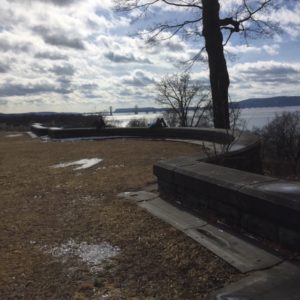View From El Yunque National Forest; March 13, 2019
“Travel is fatal to prejudice, bigotry, and narrow-mindedness, and many of our people need it sorely on these accounts. Broad, wholesome, charitable views of men and things cannot be acquired by vegetating in one little corner of the earth all one’s lifetime.” – Mark Twain
On our way to El Yunque National Forest, Narayan De Jesus Reyes, our excellent tour guide and driver, made a stab at this quote. Our small white bus weaving in and out of Puerto Rican traffic and over the island’s not-great roads, Narayan got Twain’s remarks pretty much right— although he was a little shaky on attribution. (Which happens a lot with Mark Twain quotes, right?)
So many ironies, so many paradoxes, so much to consider and to hold:
That so often, it is only the privileged who can afford to travel!
That, seemingly, travel = selfies these days, i.e. an opportunity, for example, to pose in front of a rainforest waterfall, post your ecstatic face on social media, then climb back onto a tour bus.
That there were so many tour buses! As we moved from site to site—most of the park’s trails are still inaccessible so we mostly stopped at look-out areas—Narayan constantly struggled to find a place to park. Every day, two or three humungous cruise ships visit San Juan; every day those cruise folks book tour buses bound for El Yunque.
These other tour buses proved a personal struggle. I resented all those fossil-fuel-powered vehicles—like the one I rode on; like the plane I flew on—and was grateful that this still-recovering-from Hurricane Maria paradise might benefit from all those tourists’ dollars. (That our mainland money might actually benefit Puerto Rico was a major reason why my husband and I had chosen to go there.)
That, according to Narayan, a good third of the rainforest’s trees had been destroyed by yet another climate-change-era superstorm. And, as one of the park’s rangers later told us, its famous, endangered parrots were seriously impacted by such devastation and now seem to have disappeared. The kicker? I only know this because I can afford to take a guided tour to this holy place in a fossil-fuel-spewing bus!
About that holy place: For our last stop, Narayan had arranged for us to bathe in a delightful swimming hole surrounded by rich, tropical foliage and fed by a rainforest-generated river. Think of it! As I sat on a volcanic rock at the bottom of a small, gurgling waterfall in bright sunshine listening to birdsong and the soft, gentle murmur of three young women nearby, I felt wholly blessed. Annointed. Utterly grateful. “My people believe El Yunque takes care of us,” Kenia, who served me breakfast the next day, explained. “That’s what you were feeling.”
Oh.











